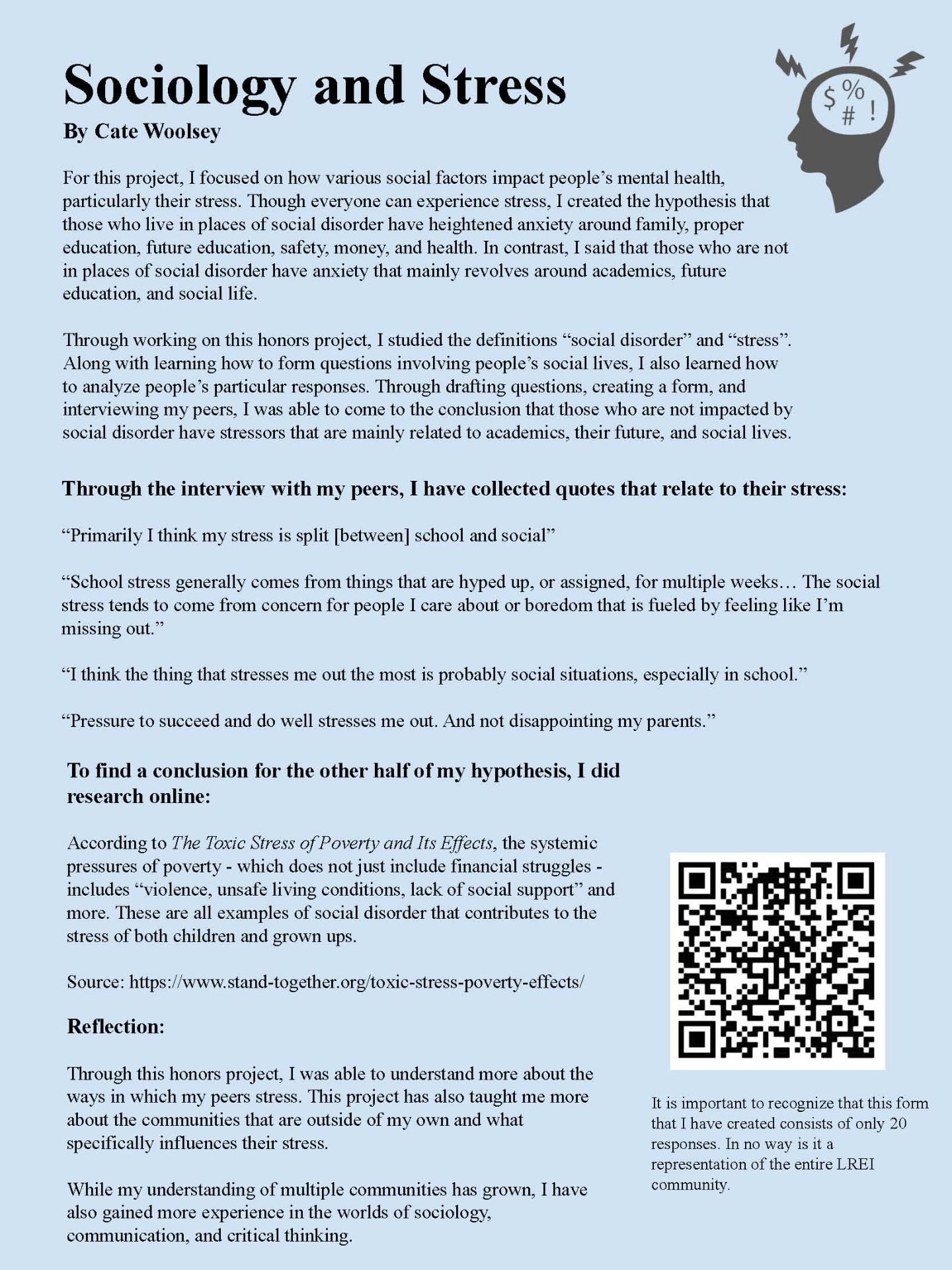Project by: Cate Woolsey (11th Grade)
Project Advisor: Charlene Cruz-Cerdas
Student(s)’s Advisor(s): Michele Blackwell
Description of the Project: For my honors project, I wanted to focus on researching how specific social factors impact people’s mental health.
Final Product (e.g., documents, images, video, audio, poster, display, data, etc.):
 Loading...
Loading...
Final Reflection on Learning: This honors project, which was my first, was both interesting and fun. While I got the opportunity to work with my classmates, I also got to learn a lot of significant information regarding sociology and stress that I didn’t know before. Through this honors project, I was able to understand more about the ways in which my peers stress. This project has also taught me more about the communities that are outside of my own and what specifically influences their stress. While my understanding of multiple communities has grown, I have also gained more experience in the worlds of sociology, communication, and critical thinking.
Update on Progress from Weeks 1-3 (include any photos or video if relevant):
I started off this project by defining “social disorder” and “stress”. While I wondered what does social disorder look like, I found out that it can involve: over-policing, police violence, lack of money, high poverty rates, high crime rates, lack of proper education, lack of materials to receive a proper education, poor job opportunities, lack of proper health care, single-parent households, and abusive relationships (domestic and child abuse). Based on these social factors, I created a hypothesis that said those who live in places of social disorder have heightened anxiety around family, proper education/future education, safety, money, and health. In contrast, I said that those who are not in places of social disorder have anxiety that mainly revolves around academics/future education, and social life. In order to get a closer understanding of how certain social factors impact people’s stress levels, and how accurate my hypothesis may be, I decided to conduct a google form for the students at LREI. I did understand that using this google form, I was most likely able to prove only one part of my hypothesis.
Update on Progress from Weeks 4-6 (include any photos or video if relevant):
During these weeks, I started to conduct questions that I wanted to include in my google form. These questions included: what zip code is your primary home in?, who do you live with? any extended family?, where did you attend middle school?, do you participate in extracurriculars outside of school? Including but not limited to competitive sports, etc., how long does it take you to get to school?, how do you usually get to school?, if your parents/guardians work, what are their jobs?, on a scale of 1-5, how stressed do you feel on most days? (Stress – overwhelming thoughts/emotions that distract you from your daily tasks), and what factor causes you the MOST stress?. After reviewing the responses, I got a clear idea of what kind of environment most kids at LREI live in. While most responses stated that they lived in good areas, had 2 parents with decent jobs, had come from an independent middle school, and took 30 minutes to get to school, they all stated that they stress over school and/or their social life.
Update on Progress from Weeks 7-9 (include any photos or video if relevant):
Based on these results, it seems that people who live in places that aren’t highly impacted by social disorder are mainly stressed due to academics or social life. In fact, some answered that there is nothing stressing them at the moment. No one clicked on family, health, and financial well being as factors that stress them out, allowing me to understand that these are not main factors that stress out the people who answered the questionnaire (who I believe, based on the results, are mainly upper/middle class). While this data isn’t very helpful for my hypothesis about those who live in places of social disorder, it does seem to confirm that upper/middle-class stressors have to do with anxiety about academics and their future. I then conducted interviews with some of the people that filled out my form. Their words gave me a better understanding of what factors stress them out and why. To continue to prove the rest of my hypothesis, I did research online. After finding an article called “The Toxic Stress of Poverty and Its Effects”, I was able to conclude that people who live in places of social disorder do tend to stress over factors such as violence, unsafe living conditions, lack of social support, lack of financial support, and more. For the rest of the time, I worked on completing my honors project poster.


Approved